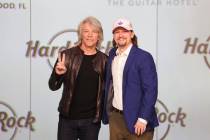Blues promoter finds a comfortable niche with Las Vegas festival
Just after noon Sept. 1, A.J. Gross typed on the Big Blues Bender’s Facebook page:
“We are completely SOLD OUT! Thank you Bender Heads! You’re the BEST!!!”
This was a triumphant announcement indeed for a consistently laid-back 51-year-old promoter who was a big part of the Las Vegas music-club and concert scene in the 1990s, but forced into early retirement when the corporate big guys came to town.
Now, the third year of Gross’ niche festival sold out a full week before its Thursday start at the Plaza. “More people than our first two years combined,” Gross says.
(If you procrastinated, you still have a shot at Wednesday’s Party With Hart, an 8 p.m. benefit for the Handy Artists Relief Trust in the Plaza showroom. Delbert McClinton and other festival headliners are promised for a $25 donation.)
But if it’s the very existence of the festival that comes as a surprise?
Hey, it’s the blues. Scale is relative.
First of all, a sellout means a little north of 2,500 people for four days of near ’round-the-clock music, Thursday through Sunday. The biggest of its three indoor and poolside stages can host about 2,000, or half the capacity of a Rod Stewart show in the Colosseum at Caesars Palace.
The top-billed headliners are McClinton, Keb’ Mo’ and Beth Hart, which raises the barrier of entry for those who can’t name a bluesman beyond B.B. King or Buddy Guy.
However, Guy was last year’s big get. And two years ago, it was the Bender which hosted King’s near-final appearance, a win-win that gave the 88-year-old legend some serious love and the festival some bragging rights.
Moreover, Gross says Nevada — the whole state — accounts for just 4 percent of ticket sales.
The Bender has instead become what some of its fans call “a land cruise”: a dry-docked version of the cruise-ship excursions for specialized music audiences, from blues to the Moody Blues.
At $140 plus fees for a single-day ticket, “We are an astronomical price by all standards of blues,” Gross says. “Portland does (a festival) where it’s 10 dollars.” But the investment “attaches them to what we’re doing and involves them.”
“These things create the relationship between us and the customer, and keeps out the looky-loos — people who don’t prioritize music to the level the rest of our fans do … . These people’s core thing in common is a serious, deep love of music.”
It takes one to know one.
The Bender’s guiding force gave up a lucrative job as a poker-room dealer at The Mirage in 1991 — back when the place was the newest, hottest casino on the Strip — to manage a rockabilly band called the Ruffnecks and to work the door at the Sand Dollar Lounge for $20 per night, plus free beer.
“I was making good money, but it was giving me an ulcer,” he said of card dealing. “As soon as I quit the job I never had any more stomach problems.”
He pitched the Ruffnecks to Terry O’Halloran, owner of the just-opened Fremont Street Reggae & Blues club in 1992. “When I came in to negotiate, he said, ‘You’re pretty good at this. How about coming to work for us and booking all our bands?’ ”
And so he did, for $150 a week, for the club’s four-year run. Those who know what the East Fremont district has become will recognize the club was in the perfect location 20 years too early.
“I think it might have survived if they hadn’t put the canopy downtown,” Gross says of Fremont Street Experience. “The whole building of the canopy just killed downtown for a long time.”
After the club closed, the Reverend Horton Heat’s manager called and asked where his client was going to play now? The answer became another revered bygone venue, the Huntridge Theater. And A.J. Productions was born.
In time, Gross hosted rockers such as Incubus, Disturbed, System of a Down, Slipknot and Pantera. But when the concert industry consolidated and the Strip opened corporate venues such as the Hard Rock Hotel and House of Blues, “I gave it up,” he says.
By the end of 2002, “I was basically semi-retired,” beyond a few events such as the “Boulder Blues” at Boulder Station. The advent of a 10 percent live entertainment tax was “a bit of a death knell for independent concert promoters outside of the casino situation.”
It was O’Halloran who indirectly brought him back. His former Fremont club boss had started planning a Las Vegas blues festival, just about the time Gross was contemplating a jam-band fest. “We both had the same idea, except the genre’s different,” so they teamed up.
But O’Halloran was working long distance and “I found him not listening to my guidance,” he says. Things went south to the point of collapse with the first host casino. With five business days left before fans started arriving in town, Gross somehow found a sympathetic sales manager at the Riviera.
“Next thing you know, we saved everybody’s vacation,” he says. “We made that show happen by the skin of our teeth — understaffed, underfunded, under everything.”
Now, Gross taps into a career’s worth of expertise about the blues scene and its players. Though he begs to differ.
“The thing I’m most experienced to comment on is comfort,” he says with a laugh. “I have been going to a lot of festivals in my life, and I want to be comfortable. I don’t want to use a Porta-Potty anymore, or muscle through the mud from stage to stage.”
It was even in the first Bender’s advertising: “No Porta-Pottys.” Now, he says, “The new catchline is ‘Everything an elevator ride away.’ ”
You can sing the blues, but you don’t have to live them.
Read more from Mike Weatherford at reviewjournal.com. Contact him at mweatherford@reviewjouranl.com and follow @Mikeweatherford on Twitter.






























